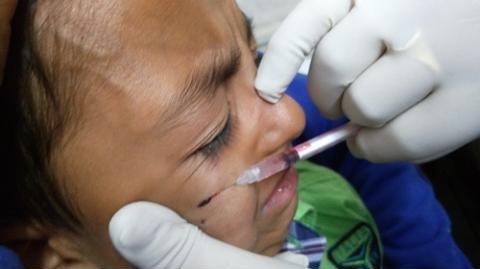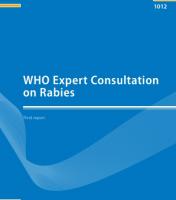First monoclonal antibody replacement for RIG launched
- Community News
- Policy and advocacy
The first monoclonal antibody product developed to replace the rabies immunoglobulin (RIG) component of rabies post exposure prophylaxis (PEP) is now available across India. Rabishield is manufactured by the Serum Institute of India, in partnership with Mass Biologics, of the University of Massachusetts Medical School in the US, which developed the technology and was launched in late October after much anticipation.
Current estimates show that only 1% of people who should be treated with RIG actually receive it. The extremely high cost and scarcity of human RIG is a huge problem in most canine rabies-endemic countries. Equine RIG (eRIG, manufactured in horses) is less scarce and much cheaper, but still presents significant production barriers to production which means manufacturers are ceasing production. The use of eRIG has also been associated with very rare, but severe cases of anaphylactic shock. Because of these concerns, alternatives to RIG and eRIG have been in development for decades now.
Rabishield is a human monoclonal antibody manufactured by recombinant DNA technology. It has been tested in vivo and in silico against a large number of street rabies isolates and passed clinical trials in India showing that it is as effective as human RIG. According to the manufacturer, the product offers passive immunization against all rabies serotypes found in India. It is described as more potent, requiring a lower dose (3.33 IU/kg body weight) than current rabies immune globulins (20 or 40 IU/kg of body weight for HRIG or ERIG, respectively), which the manufacturer claims makes it much more cost-effective.
The arrival of a new product that could increase access to life-saving PEP is of course welcomed but has also raised some concerns. The product contains just one mAb, which does not meet the WHO recommendations that a mix of at least two antibodies is needed to guard against the possibility that rabies strains that escape the protection of a single mAb will be discovered. Given the novelty of the Rabishield product, under WHO recommendations post-marketing surveillance should be rigorously pursued to ensure that any failures are adequately documented.
The recent recommendations from the WHO Strategic Advisory Group of Experts that reviewed rabies PEP add two further points relating to the cost-effective use of RIG and its alternatives. First, new data from Cambodia and Tanzania suggests that thorough wound washing and prompt administration of vaccine alone is sufficient to protect 99% of category III bite victims from rabies. With this in mind, it is unclear that the manufacturer’s claim that the product will “significantly reduce the overall mortality rate” will hold true. Second, after thorough wound infiltration, it is no longer recommended that extra RIG is administered intramuscularly distant to the wound, as it has been shown to have very limited value. This would suggest that the new product labelling (which suggests that any product that cannot be infiltrated into the wound should be injected elsewhere intramuscularly) is not promoting the latest recommendations, and the lowest possible dose and cost per patient.
Information on the price of the product is not readily available online, but in the state of Himachal, a 2.5 ml (100 IU) vial is costing Rs. 8450/- or $132 (Dr Bharti, pers. comm.). In the same state 5ml vials of high quality eRIG (with no reported anaphylaxis events following local wound infiltration of thousands of patients) containing 1,500 IU cost just $10 (Dr Bharti, pers. comm.). Based on these figures, the new product would cost $4.39 per kg of bodyweight compared to $0.27 per kg of bodyweight for the existing eRIG product. Thus the new product is not as cheap as some had hoped and further cost cuttings will likely be necessary before this product is useful to most communities, especially in poor endemic regions.
If you are interested in learning more about Monoclonal Antibodies as a RIG replacement or learning about the latest WHO guidelines, please register for our online Rabies Healthcare Certificate course. The course is free and you will receive a certificate of achievement upon completion. Learn more here.
Written by Louise Taylor of GARC, based on the press release for the product and other references linked to above. With thanks to Dr. Omesh Bharti for his inputs and for providing the costs of the products.

